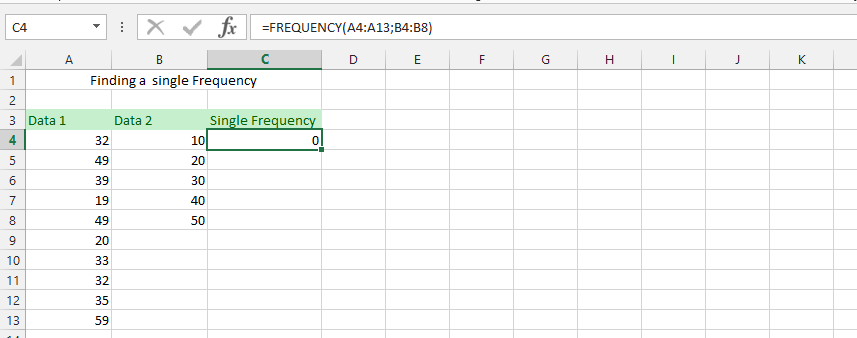How to Calculate Frequency in Excel
The FREQUENCY function in Excel calculates how often values occur within specified ranges. It returns a vertical array representing the frequency distribution of the data. This is useful for grouping data into categories or bins.
Understanding Frequency Function’s Parameters
The Frequency function in Excel relies on two arrays: the data array and the bins array, working in tandem. Both are essential inputs for the function to operate.
Data Array: This array contains the values for which the frequency is calculated.
Bins Array: Determines the intervals for grouping values in the data array.
Examples of Frequency function
Finding a Single Frequency
Utilizing the Frequency function to isolate a singular frequency from multiple occurrences proves incredibly useful in Excel.

Multiple Frequency in Data
Extending the previous example, determining multiple frequencies from the given data can satisfy curiosity. This involves assessing the repetition of different values.

Frequency of Non Communication
Examining customer interactions to identify any who haven’t been contacted recently is crucial. Non-communication may signal various risks, such as discontinued product usage.

Employee Sales Frequency Yesterday and Today
Calculating how often employees make sales on different days, tracking occurrences to assess performance.

Using Frequency Function in Exams
Teachers can leverage the Frequency function to evaluate students’ grades efficiently, facilitating assessments.

Grouping Ages
Segregating ages into specific ranges by assigning them to respective bins in Excel.

Height Distribution using Frequency Function
In a basketball tournament setup, determining the distribution of participants based on their heights aids in optimizing the process.

Handling Frequency with N/A Error
Adjusting calculations for accurate results when encountering N/A errors.

Frequency of Company’s Performance in all Departments
Assessing the frequency of services needed by customers across different departments, a vital evaluation for company performance.

Race Preparation with Frequency Function
Preparing for a race, utilizing Excel to assess the performance of candidates against specific criteria, making decisions based on percentages and Frequency function outputs.






Leave a Reply